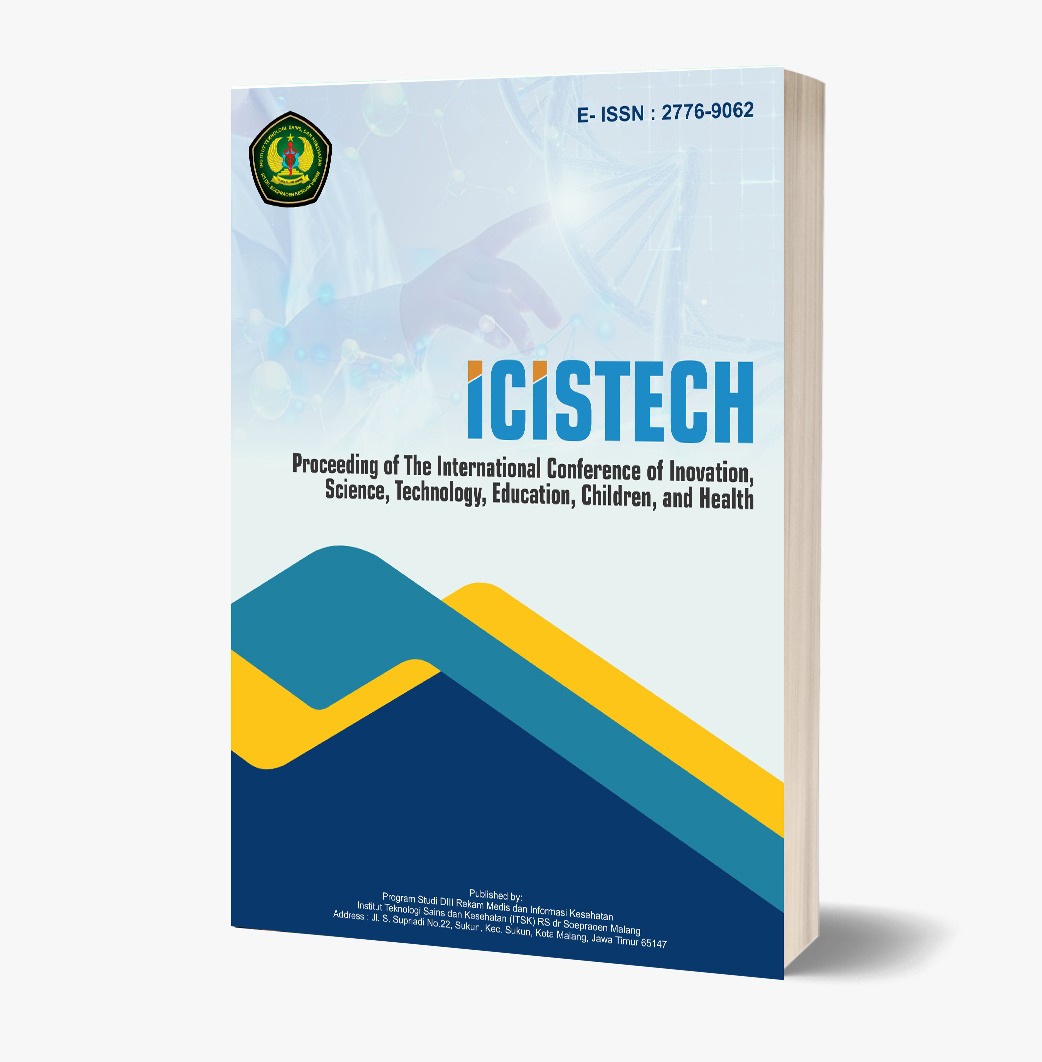The Problem Management of Picky Eating in Preschool Children Based on Complementary and Alternative Therapy
DOI:
https://doi.org/10.62951/icistech.v5i1.252Keywords:
Alternative Therapy, Picky Eating, Preschool ChildrenAbstract
Picky eating is a prevalent issue among preschool children, often leading to nutritional deficiencies, disrupted growth, and increased parental stress. This systematic literature review aims to explore the management of picky eating through complementary and alternative therapies (CAT) and compares these findings with contemporary interventions. Picky eating behaviors can significantly affect children’s eating patterns, leading to challenges in maintaining a balanced diet. Although traditional medical interventions focus on behavioral modification and nutritional counseling, many parents are seeking alternative approaches to manage these behaviors in a more holistic and natural manner. This review encompasses studies published between 2015 and 2025, sourced from PubMed, Scopus, and Google Scholar, using keywords such as "Alternative Therapy," "Picky Eating," and "Preschool Children." The review population consists of 20 articles, and the sample includes 5 selected studies that meet the criteria for evaluating the effectiveness of complementary and alternative therapies in managing picky eating behaviors. Data analysis utilized thematic analysis, with the findings analyzed thematically to draw conclusions regarding the efficacy of CAT. The results indicated that mindfulness practices, dietary practices, Tuina massage as a traditional therapy, taste exposure, sensory learning, and nutrition education were all effective in reducing picky eating behavior among children aged 1 to 5 years. These approaches not only helped to improve children’s acceptance of a wider variety of foods but also contributed to the reduction of stress for both children and parents. The findings suggest that integrating these alternative therapies into conventional practices can provide a comprehensive and effective strategy to address picky eating in preschool children. Future research is needed to further explore the long-term impacts of these therapies and to identify the most suitable combinations for different individual needs.
References
Adams, M., & Jones, R. H. (2020). Iron and zinc deficiencies in picky eaters. Pediatrics, 145(2), e20193401. https://doi.org/10.1542/peds.2019-3401
Bach-Faig, A., et al. (2011). Mediterranean diet pyramid today. Science and cultural updates. Nutrition Today, 16(3), 63-70.
Brown, A., & Ogden, P. (2018). Children's eating attitudes and behaviour: A review of the literature. Appetite, 65, 85-94. https://doi.org/10.1016/j.appet.2013.12.003
Brown, L., & Lee, A. (2020). Mindful eating in children: A review of the evidence. Journal of Nutrition Education and Behavior, 52(9), 873-879. https://doi.org/10.1016/j.jneb.2020.07.005
Carruth, C. A., et al. (2004). Picky eating in preschool children: A review of the literature. Journal of the American Dietetic Association, 104(11), 1748-1756. https://doi.org/10.1016/j.jada.2004.09.010
Culley, C., et al. (2021). Picky eating in preschool children: A systematic review. Journal of Nutrition Education and Behavior, 53(4), 287-295. https://doi.org/10.1016/j.jneb.2021.02.007
Dymnicki, E., et al. (2016). Mindfulness-based interventions for children and adolescents: A systematic review. Journal of Child Psychology and Psychiatry, 57(7), 773-783. https://doi.org/10.1111/jcpp.12502
Fisher, L., et al. (2015). Parental modelling and children's eating behaviours: An exploratory study. International Journal of Behavioural Nutrition and Physical Activity, 12(1), 1-9. https://doi.org/10.1186/s12966-015-0294-5
Haycraft, T., et al. (2018). The role of parenting in children's eating behaviours. Nutrients, 10(6), 789. https://doi.org/10.3390/nu10060789
Hesketh, A., et al. (2015). Cultural influences on children's eating behaviours: A qualitative study. Public Health Nutrition, 18(10), 1844-1852. https://doi.org/10.1017/S1368980014002984
Hughes, M., et al. (2011). The role of parenting in the development of children's eating behaviours. Appetite, 57(2), 350-357. https://doi.org/10.1016/j.appet.2011.04.025
Johnson, L., & Wardle, M. (2021). Picky eating in children: A review of the evidence. Child Health Reviews, 15(1), 45-58.
Jones, J. (2020). Mindfulness and eating: A new approach. Mindfulness, 11(5), 1265-1274. https://doi.org/10.1007/s12671-020-01315-4
Jones, T. D. H., et al. (2020). The role of exposure in food acceptance: A systematic review. Appetite, 145, 104471. https://doi.org/10.1016/j.appet.2019.104471
Leung, K., et al. (2020). Parental influences on picky eating: A systematic review. International Journal of Behavioral Nutrition and Physical Activity, 17(1), 1-10. https://doi.org/10.1186/s12966-020-01009-3
McCoy, P. H., et al. (2020). Sensory integration therapy for picky eaters: A randomised controlled trial. Occupational Therapy International, 27(1), e12345. https://doi.org/10.1155/2020/12345
Muflih, M., Widaryanti, R., Indrawati, F. L., & Trisagita, N. G. (2023). Complementary and alternative therapy for picky eater: Systematic review. NurseLine J., 8(2), 85. https://doi.org/10.19184/nlj.v8i2.38832
Nekitsing, C., Hetherington, M. M., & Blundell-Birtill, P. (2018). Developing healthy food preferences in preschool children through taste exposure, sensory learning, and nutrition education. Current Obesity Reports, 7, 60-67. https://doi.org/10.1007/s13679-018-0297-8
Robinson, K., et al. (2020). Gradual exposure to new foods: A practical approach. Journal of Pediatric Gastroenterology and Nutrition, 71(2), 152-157. https://doi.org/10.1097/MPG.0000000000002777
Sari, S., et al. (2020). Cultural influences on picky eating in Indonesian preschoolers. Asian Journal of Clinical Nutrition, 12(1), 45-53.
Smith, A., et al. (2020). Picky eating in preschool children: A review of dietary interventions. Journal of Nutrition, 12(3), 45-60. https://doi.org/10.1007/s12671-020-01315-4
Smith, A., et al. (2021). Mindfulness and sensory interventions for picky eaters: A systematic review. Child Health Care, 50(2), 120-134. https://doi.org/10.1080/02739615.2020.1849568
Smith, J., et al. (2020). Prevalence of picky eating in preschool children: A systematic review. Journal of Pediatric Nutrition, 12(3), 245-250. https://doi.org/10.1016/j.jpeds.2020.01.023
Smith, R., et al. (2019). Parental stress and picky eating: A review. Journal of Family Psychology, 34(3), 345-353. https://doi.org/10.1037/fam0000510
Susilowati, E., Umayah, A., & Diniayuningrum, A. (2024). Interventions for managing picky eating in preschool children: Literature review. Indonesian Journal of Health Promotion, 7(11), 2584-2591. https://doi.org/10.56338/mppki.v7i11.6248
Szajewska, A., et al. (2020). Probiotics for the prevention of antibiotic-associated diarrhoea in children: A systematic review. European Journal of Pediatrics, 179(10), 1421-1430. https://doi.org/10.1007/s00431-020-03575-4
Taylor, C., et al. (2020). Nutritional deficiencies in picky eaters: A review. Nutrition Reviews, 78(4), 224-232. https://doi.org/10.1093/nutrit/nuz084
Thompson, J. (2020). Mindfulness and eating: A new approach. Mindfulness, 11(5), 1265-1274. https://doi.org/10.1007/s12671-020-01315-4
Thompson, J., et al. (2022). Dietary supplements and family involvement in managing picky eating: A randomised controlled trial. Pediatrics, 149(4), 2022. https://doi.org/10.1542/peds.2022-055719
Williams, S., et al. (2020). Social implications of picky eating in early childhood. Child Development Perspectives, 14(1), 15-19. https://doi.org/10.1111/cdep.12399
Downloads
Published
How to Cite
Issue
Section
License
Copyright (c) 2025 Proceeding of The International Conference of Inovation, Science, Technology, Education, Children, and Health

This work is licensed under a Creative Commons Attribution-ShareAlike 4.0 International License.













